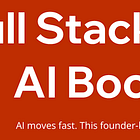Memory Dims, Meaning Abides
Few things in life beat good times with friends.
(A code for £150 off Full Stack Founder AI Bootcamp (Dec 2-3 London) is at the end of the post)
A few people said they really appreciated what I told them at a party last Saturday. I don’t remember speaking to that many people, and certainly not the details of what I might have said to each. It was a party, after all, and by that point in the evening, we were all somewhere beyond our usual selves.
But if I were to guess, maybe I said something along the lines of, You’re already perfect as you are, which sounds absurd on the face of it, but is it? We tend to live our lives forgetting things are fundamentally okay. I don’t mean that things are exactly as we want them to be. We’re never quite as successful, or young, or mature, or loving, or rich, or healthy as we imagine we should be.
But that’s just our idea of ourselves we’re chasing. That’s the reason to let the idea of ourselves go, to stop imagining how things should be and just be as we are. That’s where we might unexpectedly find perfection.
That things are already perfect doesn’t mean there’s nothing to do. We might feel that the only reason to do anything is to fix what’s broken: make money because there isn’t enough, improve our products so that we maintain the lead over the competitors, exercise because otherwise we won’t be attractive.
It’s not about changing what we do, but about our attitude to it. We can recognise that things are actually quite okay — maybe that’s a better wording if “perfect” sounds too good to be true — and keep on living our lives doing much the same things except without some underlying anxiety that we always took for granted. It really doesn’t have to be there.
Now that I’m talking about it, I remember telling a friend that we truly don’t know what’s good for us and what’s bad. Sure, we’ve seen this fortune cookie before but it’s worth trying to live from that place. Inevitably failing and then trying again. We still make choices, pursue goals and have preferences, but once something happens or is achieved, how can we be certain where that will take us?
Steve Jobs famously said that you can only connect the dots looking backwards, and yet we’re constantly trying to connect them looking forward. We inevitably fail and instead of recognising the futility of the exercise, we decide to ‘take lessons’ and do better next time. Maybe Steve Jobs had a point, after all? Here I am, sitting and connecting the dots from last weekend deep in a Welsh forest.
I don’t think I told many people this, but there must have been at least one friend I told that they can trust their internal sense of what’s right. We all have it, but it’s usually barely heard behind the noise the mind makes. It’s a sense, not even a feeling, and it’s deeper than intuition. It’s an inner compass that some of us might have discovered that night, and when we find it, it’s wise to trust it.
Hearing something like this only makes sense once you have got a sense of where this inner compass is and just need a tiny bit of reassurance that you aren’t imagining it. You aren’t. But if you haven’t found it, it makes no sense to hear about it. Our minds don’t like their authority to be challenged.
Whatever might have happened at that party will remain a mystery not only to me, but to many others, too. We will forget the details and exact words, but we all will remember how we felt in the moment. It was special.
And I publicly promise not to do anything like this again at the next event. I mean, what tf was I thinking…
On 2-3 Dec, I’ll be speaking and facilitating at the third Full Stack Founder AI Bootcamp in London. I wrote all about it and why you should join here:
Last time my discount code gave £100 off the ticket price. This time, I’m told it’s £150 off with code EVGENY150. You’re welcome :) See you there!



